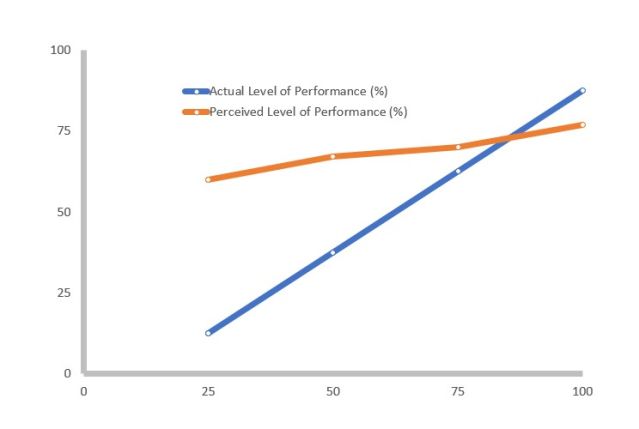Dunning-Kruger Effect
How to Outsmart Yourself
Cultivate self-awareness to spot the red flags of self-deception.
Updated November 23, 2023 Reviewed by Tyler Woods
Key points
- Self-deception is real and widespread.
- Self-deception is challenging to recognize and can be costly or even dangerous.
- There are several ways you can overcome self-deception, including sustaining humility.
Many people deceive themselves. In the 1990s, researchers Justin Kruger and David Dunning formulated an idea about self-deception called the Dunning-Kruger effect (DKE) (1). Specifically, the effect refers to a cognitive bias in which less-skilled or less-knowledgeable people tend to overestimate their abilities (see Figure 1). This is why most people in society believe they’re better than average in things like driving, teaching, reasoning, test-taking, and socializing.

For almost two decades, it seemed like the DKE was a settled matter. But in 2017, mathematician Edward Nuhfer and his team threw a wrench into the works. They argued that the DKE came mainly from how data was pooled in Kruger and Dunning’s 1999 study (2). This caused a stir, with some thinking the DKE was debunked, especially due to media coverage in outlets like Scientific American and Psychology Today.
However, Nuhfer and colleagues' argument falls short due to several critical flaws in their paper. Firstly, it misunderstands the DKE concept, confusing it with Kruger and Dunning’s 1999 experiment. Additionally, it fails to explain why the DKE appears in studies without data pooling or why it varies across different cultures. Also, psychologists Stuart Vyse and Dunning himself provided thorough analyses debunking Nuhfer et al.’s claim. Perhaps the most compelling counterargument came from Rachel Jansen and her colleagues, who used a more robust model and a large dataset (3), reaffirming the prevalence of the DKE.
Cut to the real-life drama, and guess who's been personally victimized by self-deception? Yours truly. After co-authoring my first English book, The Beaver, I thought I had mastered the new language as well as my native Chinese.
New books with great insights were on the horizon. And, indeed, every idea I pitched got much praise from friends and colleagues. Life felt like a blissful echo chamber until reality hit me with a pile of rejection letters—a decade's worth. By then, I had run out of all possible excuses.
Queue the self-reflection montage. I faced the harsh truth: my writing sucked. But what I did right was not throw in the towel. Instead, I spent the next three years taking six courses in the English writing program at my university, turning rejection into a catalyst for improvement.
The result? The Fairness Instinct hit the shelves, and The Liars of Nature and the Nature of Liars became my humble nod to past self-deception.
My story isn't just a stroll down memory lane; it's a bright neon sign showing the potential consequences of self-deception, with overconfidence as the biggest threat. If it cost me a decade, imagine the ripple effect—from family drama to romantic misadventures, or worse, the chaos of a mid-air catastrophe or the decisions that lead to wars, as evolutionary biologist Robert Trivers shows us in The Folly of Fools.
Now, let's tackle the big question: How can we outsmart ourselves and dodge the self-deception bullet? As knowing one's own performance can be easily blinded by self-deception, the imperative is to seek external references that serve as a reliable reality check.
Here are three thoughts from my Liars book to keep you grounded:
- Mottos and Role Models: Stick some wise sayings or influential figures on your mental bulletin board to remind yourself to stay humble and embrace your flaws.
- Seeking and Learning From Criticism: Build a squad of friends, especially the brutally honest ones. Reward them in some way for taking the risk of being critical.
- Sustaining Humility: Wear humility like a superhero cape if you're doing well. It's your protection from overconfidence, the tricky villain trying to bring you down and hinder your chances of more success.
As a bonus, let's add a fourth method to your arsenal: use objective data as a reality check. It's like having a truth serum for your ego.
No cherry-picking allowed; reject your perceptions if they clash with the cold, hard facts. This method, straight from the playbook of modern psychology and its scion, behavioral economics, is your secret weapon in navigating the rollercoaster of self-deception.
So, there you have it: A guide to outsmarting the trickster that is self-deception. It's not just about dodging the pitfalls; it's about crafting a reality-based superpower that keeps you soaring, feet firmly planted on solid ground. You got this.
References
1. Kruger, J., & Dunning, D. (1999). Unskilled and unaware of it: how difficulties in recognizing one's own incompetence lead to inflated self-assessments. Journal of personality and social psychology, 77(6), 1121.
2. Nuhfer, E., Fleisher, S., Cogan, C., Wirth, K., & Gaze, E. (2017). How random noise and a graphical convention subverted behavioral scientists' explanations of self-assessment data: numeracy underlies better alternatives. Numeracy, 10(1), 4.
3. Jansen, Rachel A., Anna N. Rafferty, and Thomas L. Griffiths. 2021. A rational model of the Dunning–Kruger effect supports insensitivity to evidence in low performers. Nature Human Behaviour 5(6): 756–63.




